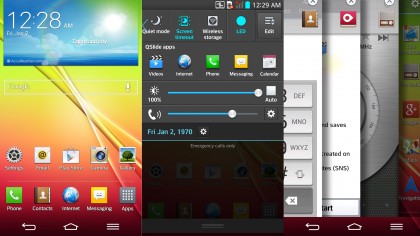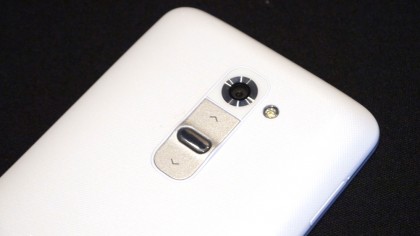LG G2 vs Samsung Galaxy S4 vs HTC One vs iPhone 5
Design, screen, features and more compared
Sign up for breaking news, reviews, opinion, top tech deals, and more.
You are now subscribed
Your newsletter sign-up was successful
OS/UI
The LG G2 ships with Android 4.2.2, which is a bit of a shame since we're up to 4.3 now. On the interface front it puts a lot of focus on ease of use and has a bunch of features to support that, such as 'Answer Me' mode, which allows users to answer the phone simply by putting it to their ear, or 'Plug & Pop' which appears whenever you plug headphones in, making it easier to access the apps and features that you're likely to want to use. Alone some of these features would be quite intuitive, but with so many different ones built in it could take a while to get used to.
The Samsung Galaxy S4 and HTC One both also have Android 4.2.2 and like LG the companies have skinned the interface in individual ways. The Galaxy S4 is fairly easy to navigate, but like the LG G2 it has a bunch of supplementary features such as 'Air Gesture' which lets you swipe the air in front of the screen rather than the screen itself in order to interact with the phone, or eye-tracking features which ensure the screen never turns off while you're looking at it.

The HTC One feels rather bare-bones in comparison but that's not necessarily a criticism. It's highly intuitive and easy to setup, with only BlinkFeed (an aggregated news feed which you can't turn off) serving as a potential annoyance.
The iPhone 5 is the odd one out here as it's the only handset in this comparison not running Android, but being an iPhone it's all about intuitiveness and while some may lament the lack of flexibility in Apple's OS, it makes it very easy to learn and for the most part it's very slick to use.
Camera
As increases in processor speeds and screen resolutions become increasingly meaningless the camera seems to be the new smartphone battleground, with competitors vying to out-megapixel each other, provide the best low light shots or just include a bunch of different shooting modes.
The LG G2 doesn't cower from this battle, packing a 13-megapixel camera complete with optical image stabilisation. That optical image stabilisation should minimise camera shake and in so doing also allow for good low light shots as the shutter can stay open for longer without blurring the image. LG tells us it's the first time that optical image stabilisation has been implemented into a 13-megapixel smartphone camera and they've achieved it without adding much bulk.

The Samsung Galaxy S4 also boasts a 13-megapixel sensor but it doesn't have optical image stabilisation, so the LG G2 will almost certainly out-perform it in low light.
Sign up for breaking news, reviews, opinion, top tech deals, and more.
The HTC One is all about low light shots, but with just a 4-megapixel sensor its pictures are unlikely to offer the same quality as the LG G2. Finally the iPhone 5 has an 8-megapixel camera which is starting to look a bit old hat. We'll reserve final judgement till we've had a chance to properly put the LG G2 through its paces, but based on just the specs the camera should easily be able to hold its own.
Media playback
The LG G2 should be a brilliant little device for media. Not only does it have a large 5.2-inch screen but the actual quality of the picture is above-average, so it should work well for videos. It also promises top-flight sound quality, so music should be good too. With up to 32GB of built in storage coupled with a microSD card slot, there should be no shortage of space. Then there's the battery which at 3000mAh should allow the LG G2 to keep you entertained for an extended period.
James is a freelance phones, tablets and wearables writer and sub-editor at TechRadar. He has a love for everything ‘smart’, from watches to lights, and can often be found arguing with AI assistants or drowning in the latest apps. James also contributes to 3G.co.uk, 4G.co.uk and 5G.co.uk and has written for T3, Digital Camera World, Clarity Media and others, with work on the web, in print and on TV.